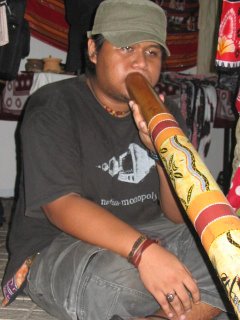 The didgeridoo (or didjeridu) is a unique wind instrument of the Indigenous Australians of northern Australia. It is sometimes described as a natural wooden trumpet or "drone pipe". Musicologists classify it as an aerophone. A didgeridoo is usually cylindrical or conical in shape and can measure anywhere from 1 to 2 metres, with most instruments measuring around 1.5 metres. Instruments shorter or longer than this are less common. Generally, the longer the instrument, the lower the pitch or key of the instrument. Keys from D to F♯ are the preferred pitch of traditional Aboriginal players.
The didgeridoo (or didjeridu) is a unique wind instrument of the Indigenous Australians of northern Australia. It is sometimes described as a natural wooden trumpet or "drone pipe". Musicologists classify it as an aerophone. A didgeridoo is usually cylindrical or conical in shape and can measure anywhere from 1 to 2 metres, with most instruments measuring around 1.5 metres. Instruments shorter or longer than this are less common. Generally, the longer the instrument, the lower the pitch or key of the instrument. Keys from D to F♯ are the preferred pitch of traditional Aboriginal players.There are no reliable sources stating the didgeridoo's exact age, though it is commonly claimed to be the world's oldest wind instrument. Archaeological studies of rock art in northern Australia suggests that the Aboriginal people of the Kakadu region of the Northern Territory have been using the didgeridoo for about 1500 years, based on the dating of paintings on cave walls and shelters from this period.
"Didgeridoo" is usually considered to be an onomatopoetic word of Western invention, but it has been suggested that it may be derived from the Irish words dúdaire or dúidire, meaning variously 'trumpeter; constant smoker, puffer; long-necked person, eavesdropper; hummer, crooner' and dubh, meaning 'black' (or duth, meaning 'native').[1] The earliest occurrences of the word in print include the Australian National Dictionary 1919, The Bulletin in 1924 and the writings of Herbert Basedow in 1926. There are numerous names for this instrument among the Aboriginal people of northern Australia, with "yirdaki" one of the better known words in modern Western society. "Yirdaki", also sometimes spelt "yidaki", refers to the specific type of instrument made and used by the Yolngu people of north-east Arnhem Land. This name is not a substitute for "didgeridoo". In Western Arnhem Land, one is more likely to hear of "mago", and again, this is a specific term not to be used loosely. There is a general consensus that it is a matter of etiquette to reserve tribal names for tribal instruments, though retailers and businesses have been quick to exploit these special names for generic tourist-oriented instruments.
- Wikipedia




0 comments:
Post a Comment